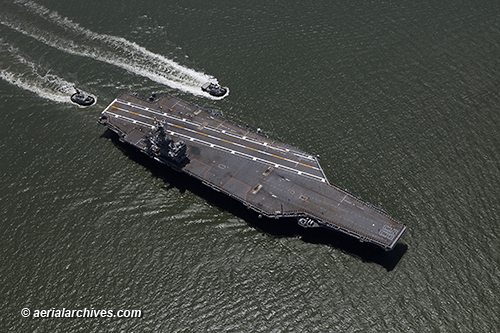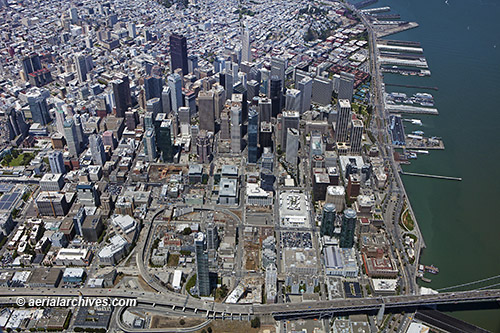 Super-carrier USS Nimitz arrived in San Francisco on May 27 in commemoration of the 75th anniversary of the opening of the Golden Gate Bridge. This aerial photograph shows the Nimitz as she is departing the San Francisco Bay area. Preceding her arrival, Nimitz departed from Naval Station Everett Washington, where sailors, accompanied by their friends and family, embarked on a three-day Tiger Cruise, which allowed the guests to experience a taste of life at sea. The Nimitz is an aircraft carrier in the United States Navy, and is one of the largest war ships in the world. Her length spans a staggering 1,092 feet (333 meters), she weighs 101,600 tons and the landing area (located on the flight deck) is only 300 to 400 feet long! To put this into perspective, let’s compare a land based airport runway to the Nimitz landing area. Generally, a land based runway can span anywhere from one to over four miles long. That is an huge difference to the Nimitz mere 300 to 400 feet of landing area. To stop incoming planes is no picnic. The ship is equipped with four arresting wires connected to a hydraulic system, which is meant to trap the aircraft, making it come to an abrupt stop in a span of two-seconds. The pilots are guided into the landing area by the Landing Officers. Pilots know they are on the correct glide path if an amber light on the deck, known as the ball, is lined up with the horizontal row of green lights. If the ball is too high, so is the plane. This indicates to the pilot that an immediate go around must occur, known as the bolter. All Nimitz class carriers are run on nuclear energy, which means their power will virtually never shut off. To stop the ship, power must be reduced to about one or two knots, at which point, the ship is extremely susceptible to wind and water conditions. This is why the Nimitz is accompanied by two smaller ships (as shown in the aerial photograph above) known as pilot tug boats. The outer sides of these boats are lined with rubber so that they can maneuver the carrier in the direction of its anchoring and docking location. Due to the massive size of the Nimitz, it takes at least a mile or more for the ship to come to a complete stop after reducing its speed. Understandably, the Nimitz was unable to dock in San Francisco, so she was maneuvered to her anchoring area, which is an extremely exciting ordeal, because the Nimitz had not anchored for two years prior to her arrival in San Francisco. When the ship passed under the Golden Gate Bridge, one could not help but notice sailors lining its edge. Known traditionally as manning the rails, this is a method of saluting or rendering honor when entering or leaving ports. Knowing that the Nimitz was currently on a Tiger Cruise, one can assume that the entire crew was on board, including their family and friends. This would bring the number of people on board to roughly 5,000 (not including family and friends). Its passing was definitely a sight to see, and will be remembered for years to come.
Super-carrier USS Nimitz arrived in San Francisco on May 27 in commemoration of the 75th anniversary of the opening of the Golden Gate Bridge. This aerial photograph shows the Nimitz as she is departing the San Francisco Bay area. Preceding her arrival, Nimitz departed from Naval Station Everett Washington, where sailors, accompanied by their friends and family, embarked on a three-day Tiger Cruise, which allowed the guests to experience a taste of life at sea. The Nimitz is an aircraft carrier in the United States Navy, and is one of the largest war ships in the world. Her length spans a staggering 1,092 feet (333 meters), she weighs 101,600 tons and the landing area (located on the flight deck) is only 300 to 400 feet long! To put this into perspective, let’s compare a land based airport runway to the Nimitz landing area. Generally, a land based runway can span anywhere from one to over four miles long. That is an huge difference to the Nimitz mere 300 to 400 feet of landing area. To stop incoming planes is no picnic. The ship is equipped with four arresting wires connected to a hydraulic system, which is meant to trap the aircraft, making it come to an abrupt stop in a span of two-seconds. The pilots are guided into the landing area by the Landing Officers. Pilots know they are on the correct glide path if an amber light on the deck, known as the ball, is lined up with the horizontal row of green lights. If the ball is too high, so is the plane. This indicates to the pilot that an immediate go around must occur, known as the bolter. All Nimitz class carriers are run on nuclear energy, which means their power will virtually never shut off. To stop the ship, power must be reduced to about one or two knots, at which point, the ship is extremely susceptible to wind and water conditions. This is why the Nimitz is accompanied by two smaller ships (as shown in the aerial photograph above) known as pilot tug boats. The outer sides of these boats are lined with rubber so that they can maneuver the carrier in the direction of its anchoring and docking location. Due to the massive size of the Nimitz, it takes at least a mile or more for the ship to come to a complete stop after reducing its speed. Understandably, the Nimitz was unable to dock in San Francisco, so she was maneuvered to her anchoring area, which is an extremely exciting ordeal, because the Nimitz had not anchored for two years prior to her arrival in San Francisco. When the ship passed under the Golden Gate Bridge, one could not help but notice sailors lining its edge. Known traditionally as manning the rails, this is a method of saluting or rendering honor when entering or leaving ports. Knowing that the Nimitz was currently on a Tiger Cruise, one can assume that the entire crew was on board, including their family and friends. This would bring the number of people on board to roughly 5,000 (not including family and friends). Its passing was definitely a sight to see, and will be remembered for years to come.
Image ID: AHLB9288
© Herb Lingl/aerialarchives.com
More aerial photography of San Francisco
More aerial photography of San Francisco bay
Navy USS Nimitz site


